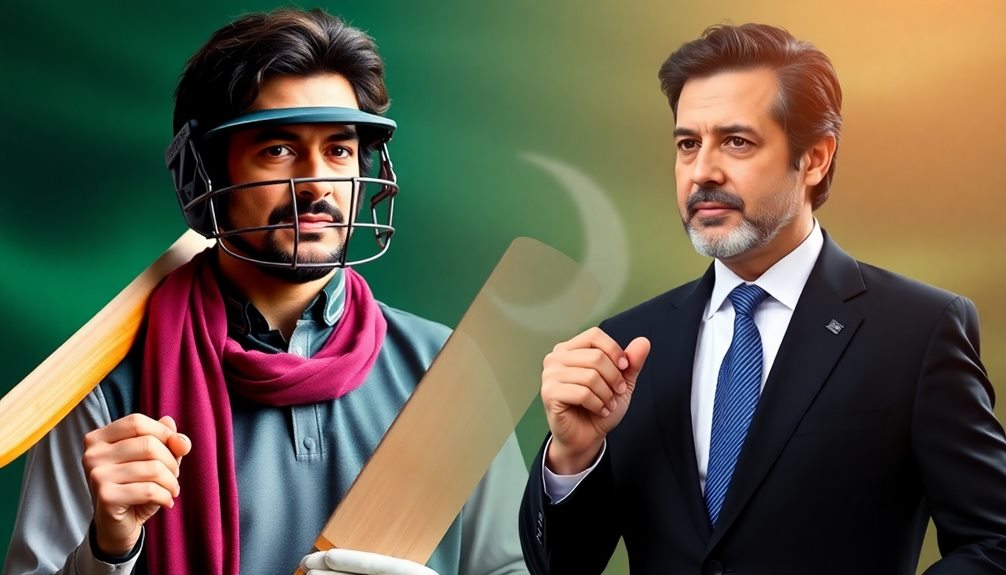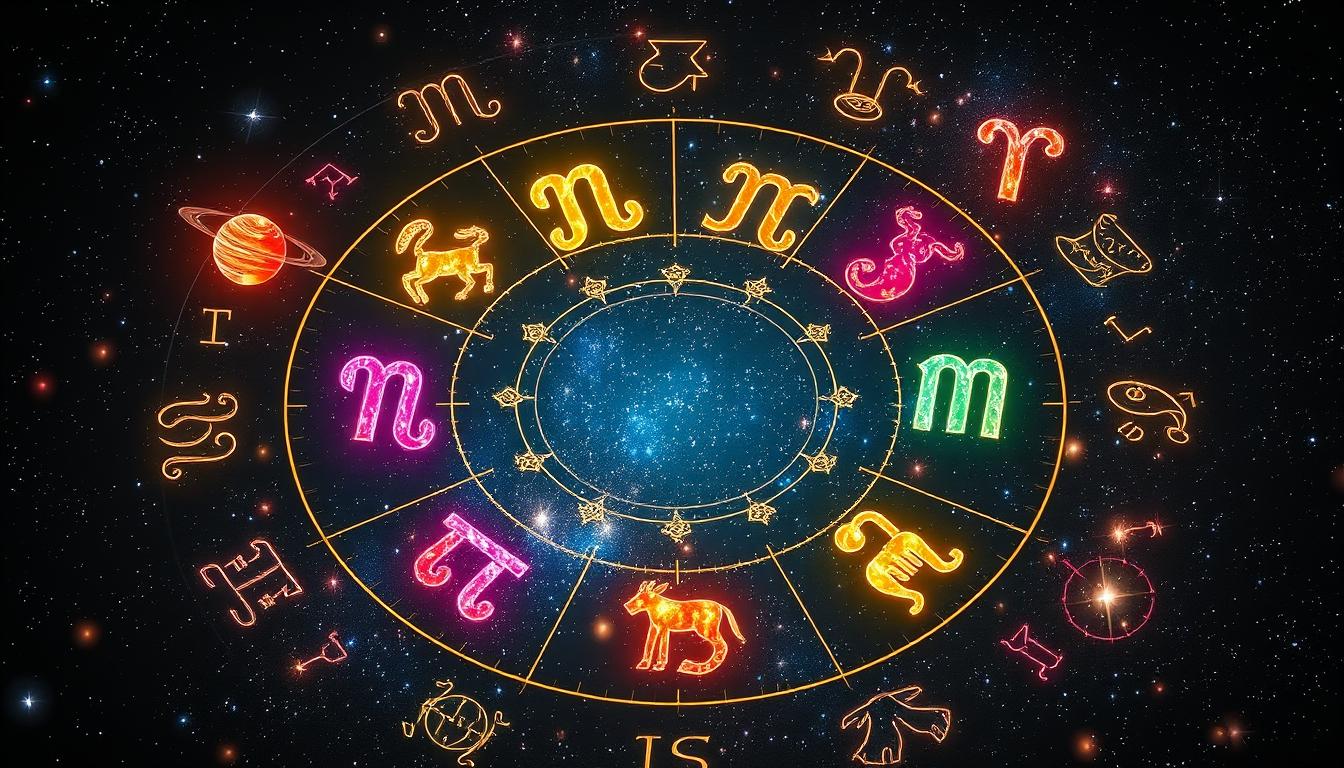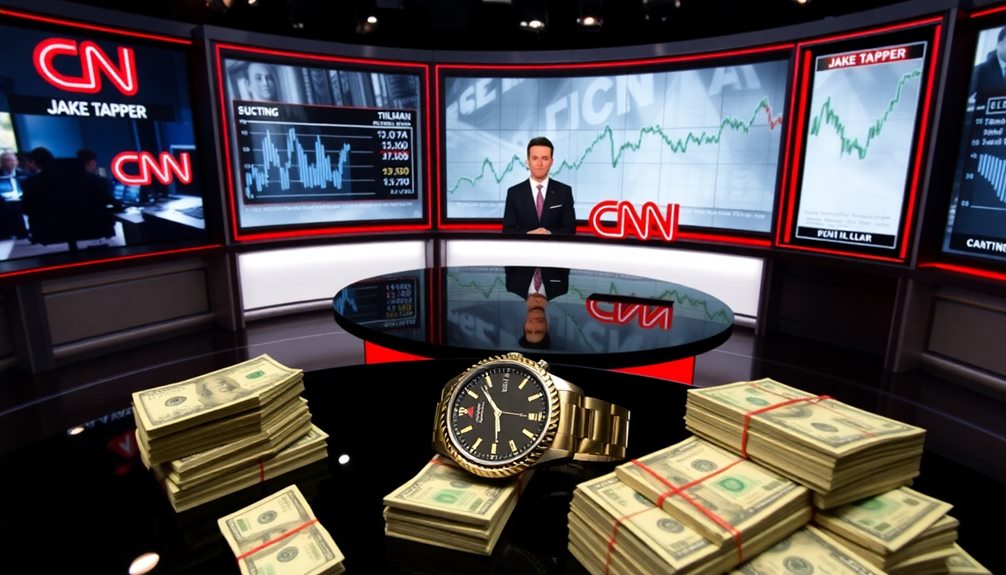Imran Khan, born on October 5, 1952, in Lahore, rose to fame as a cricketer, famously leading Pakistan to its first World Cup victory in 1992. After retiring, he founded the Pakistan Tehreek-e-Insaf party in 1996 and became Prime Minister in August 2018, driven by a wave of support for anti-corruption measures. However, he faced a no-confidence vote in April 2022, leading to his ousting. Despite this setback, Khan remains a significant political figure, rallying supporters and sparking protests. His journey is filled with twists and turns that reveal deeper layers of his influence on Pakistan's landscape.
Key Takeaways
- Imran Khan is a former cricketer who captained Pakistan to its first Cricket World Cup victory in 1992.
- He founded the Pakistan Tehreek-e-Insaf (PTI) party in 1996 after retiring from cricket.
- Khan became the Prime Minister of Pakistan in August 2018, leading PTI to a National Assembly majority.
- He was ousted from office in April 2022 through a no-confidence vote, sparking mass protests from supporters.
- Despite legal challenges and economic issues, Khan maintains a loyal following and continues to influence Pakistani politics.
Introduction
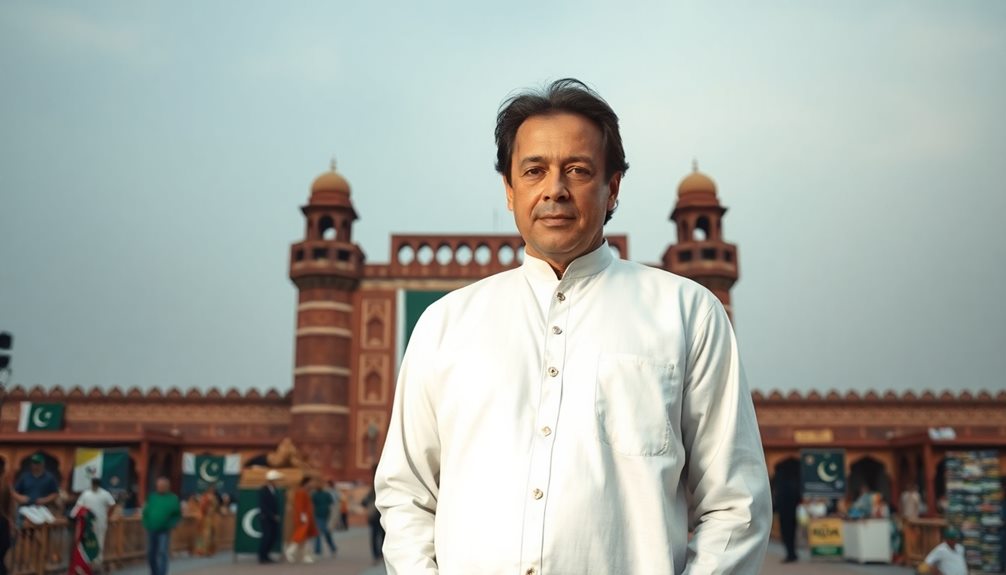
Imran Khan, a towering figure in both sports and politics, has captivated the hearts of many in Pakistan and beyond. Born on October 5, 1952, in Lahore, he first gained fame as a cricket star, leading the national team to its historic World Cup victory in 1992. This achievement cemented his status as a national hero. Imran Khan’s journey to politics began after his retirement from cricket, driven by a passion to bring about change in Pakistan. Founding the Pakistan Tehreek-e-Insaf (PTI) party in 1996, he embarked on a challenging path to reform the country’s governance and fight corruption. Over the years, his leadership and resilience transformed him into a prominent political figure, eventually leading him to serve as Pakistan’s Prime Minister from 2018 to 2022.
After retiring from cricket, Imran Khan transitioned into politics, founding the Pakistan Tehreek-e-Insaf (PTI) party in 1996. His political career focused heavily on eradicating corruption and implementing economic reforms, appealing particularly to the youth disillusioned by the status quo.
In August 2018, Khan's PTI secured a majority in the National Assembly, propelling him to the role of prime minister. His tenure was marked by his commitment to anti-corruption initiatives and the establishment of the Shaukat Khanum Memorial Cancer Hospital, further enhancing his public image.
However, despite his efforts, he faced significant challenges, including being ousted through a no-confidence vote in April 2022.
Nevertheless, Imran Khan remains a prominent figure in Pakistan's political landscape, commanding a loyal base of supporters.
Background
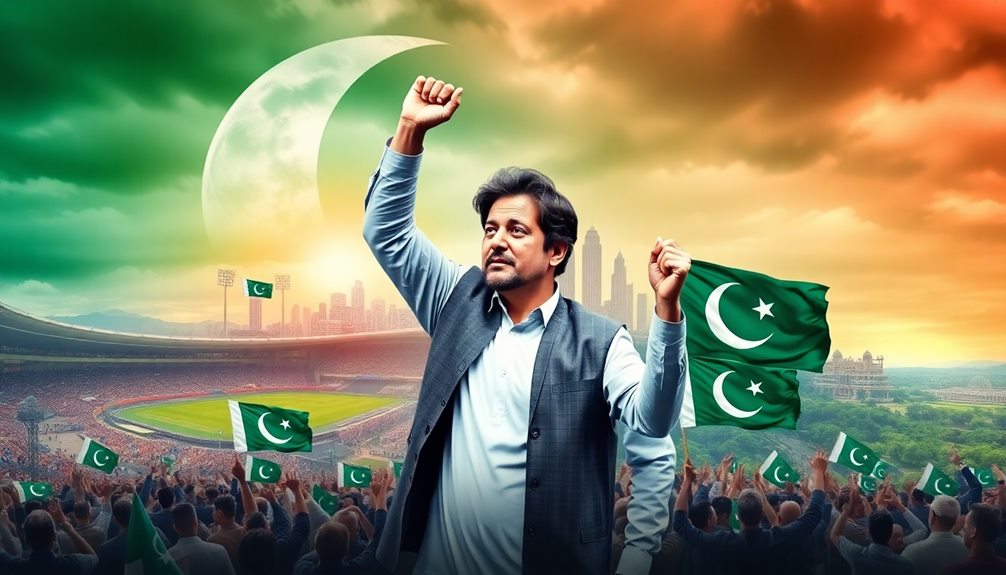
Born into an affluent Pashtun family, Khan's early life set the stage for his future successes. Growing up in Lahore, Imran Khan attended prestigious schools like the Royal Grammar School in England and Aitchison College in Lahore. He later earned a degree in Philosophy, Politics, and Economics at Keble College, Oxford.
Khan kicked off his cricket career at just 16, making his international debut in 1971. He captained the Pakistan national cricket team from 1982 to 1992, leading them to their historic Cricket World Cup victory in 1992. This triumph solidified his status as a national hero.
After retiring from cricket, Khan founded the Pakistan Tehreek-e-Insaf (PTI) political party in 1996, focusing on tackling corruption and addressing social issues in Pakistan. His charisma and commitment to reform garnered significant public support throughout the early 2010s.
This momentum propelled him to the role of Pakistani Prime Minister in August 2018, marking a major transition from sports to politics. Khan's journey reflects how a successful cricket career can lead to influential political leadership, as he sought to bring change to his beloved country.
Cricket World Cup Champion
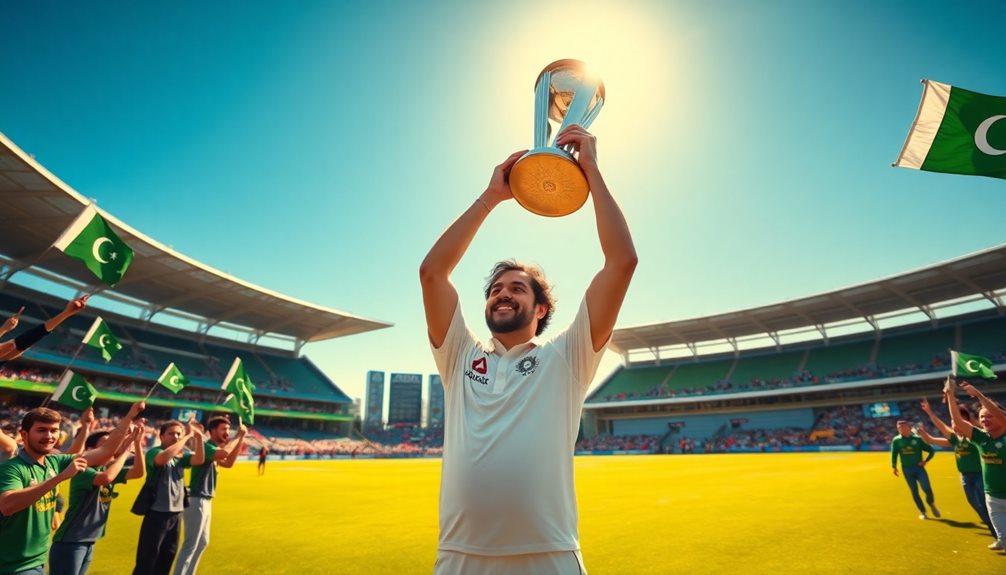
Khan's leadership on the cricket field reached its pinnacle when he captained the Pakistan national team to its first and only Cricket World Cup victory in 1992. Under his guidance, the team faced England in the final at the iconic Melbourne Cricket Ground, where they scored 249 runs.
You'd remember Khan's crucial contribution of 72 runs, showcasing his exceptional talent as one of cricket's greatest all-rounders. This World Cup victory didn't just mark a milestone in sports; it turned Khan into a national hero, igniting a fervor for cricket across Pakistan.
His success on the field paved the way for a remarkable journey beyond cricket. After retiring, Imran Khan embraced philanthropy, establishing the Shaukat Khanum Memorial Cancer Hospital & Research Centre in 1994.
This initiative demonstrated his commitment to serving the nation, intertwining his sports legacy with humanitarian efforts. As he transitioned into a political career, the foundations laid during his cricketing days continued to resonate with the people.
The triumph at the cricket World Cup remains a defining moment, solidifying Imran Khan's place not just in sports history, but also in the hearts of millions.
Supporters Rallying in Streets
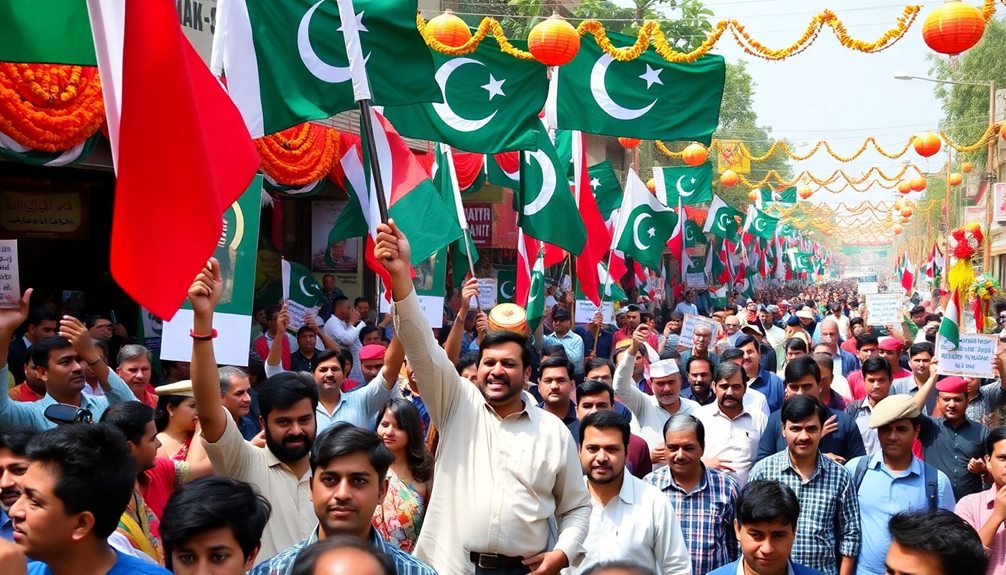
In the wake of Imran Khan's ousting as Prime Minister in April 2022, supporters flooded the streets of Pakistan, showcasing their unwavering loyalty. Tens of thousands rallied against the ruling government, voicing discontent with the political unrest that engulfed the nation.
As protests erupted, Khan's followers, united under the banner of Pakistan Tehreek-e-Insaf (PTI), demanded his release from legal challenges stemming from corruption charges.
In May 2023, Khan's arrest triggered violent confrontations with police, further intensifying the turmoil in major cities. Despite a crackdown on dissent, his supporters organized protests through social media, demonstrating resilience and determination to uphold Khan's political agenda.
This movement highlighted the deep divisions within Pakistani society, as many viewed Khan as a beacon of hope against corruption and misgovernance, while others criticized his time in office.
The protests weren't just a reaction to Khan's legal troubles but also a reflection of a broader struggle within the nation, as supporters grappled with the implications of political unrest and their vision for the future of Pakistan.
Public Perception as a Leader
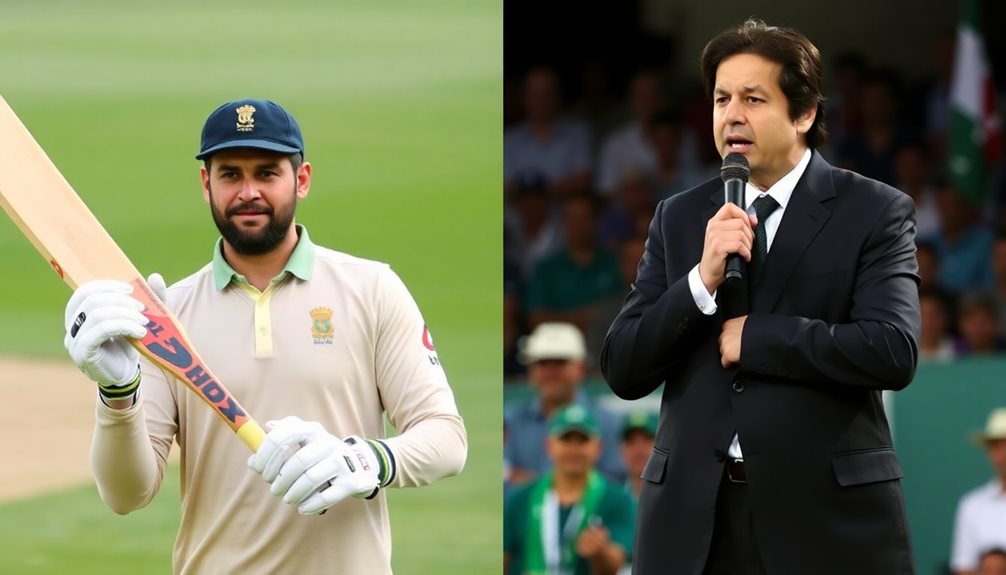
The fervent protests following Imran Khan's arrest reveal just how complex public perception of him as a leader has become. Initially, Khan captured the hearts of many Pakistanis through his focus on anti-corruption and promises to build a welfare state. His rise to power with the Pakistan Tehreek-e-Insaf party in August 2018 showcased his significant support, particularly among the youth disillusioned with traditional political leaders.
However, as rising inflation and economic challenges took center stage, public perception began to shift. His popularity waned, culminating in the no-confidence vote that removed him from office in April 2022.
Despite these setbacks, Khan's narrative, blending Islamic values with liberalism, helped him retain a loyal following.
The mass protests against his arrest in May 2023 demonstrate his enduring influence in Pakistani politics. Many still view him as a beacon of hope for change, reflecting a complicated relationship shaped by both admiration and frustration.
Ultimately, your understanding of Imran Khan as a leader hinges on this intricate balance of his early successes and the challenges that followed, revealing a public perception that remains dynamic and multifaceted.
Frequently Asked Questions
What Did Imran Khan Do for Pakistan as a Prime Minister?
As a leader, you'd see initiatives like poverty alleviation programs, healthcare improvements, and renewable energy promotion. His administration's early COVID-19 response and efforts to secure financial support also aimed at stabilizing the economy.
Why Did Imran Khan Get Removed as PM?
You'll find Imran Khan got removed as PM due to rising inflation, economic instability, and a no-confidence vote. His government's handling of these challenges led to declining popularity and allegations of conspiracy surrounding his ousting.
How Good Was Imran Khan as a Cricketer?
You'd see Imran Khan's brilliance as a cricketer in his leadership, skillful bowling, and strategic batting. His achievements, like the World Cup win and numerous records, truly showcase his exceptional talent and commitment to the game.
Who Is the Next Prime Minister of Pakistan in 2024?
You're curious about Pakistan's next prime minister in 2024. With elections approaching, various parties are positioning candidates, while Imran Khan's legal troubles may affect his party's participation and influence voter sentiment.

